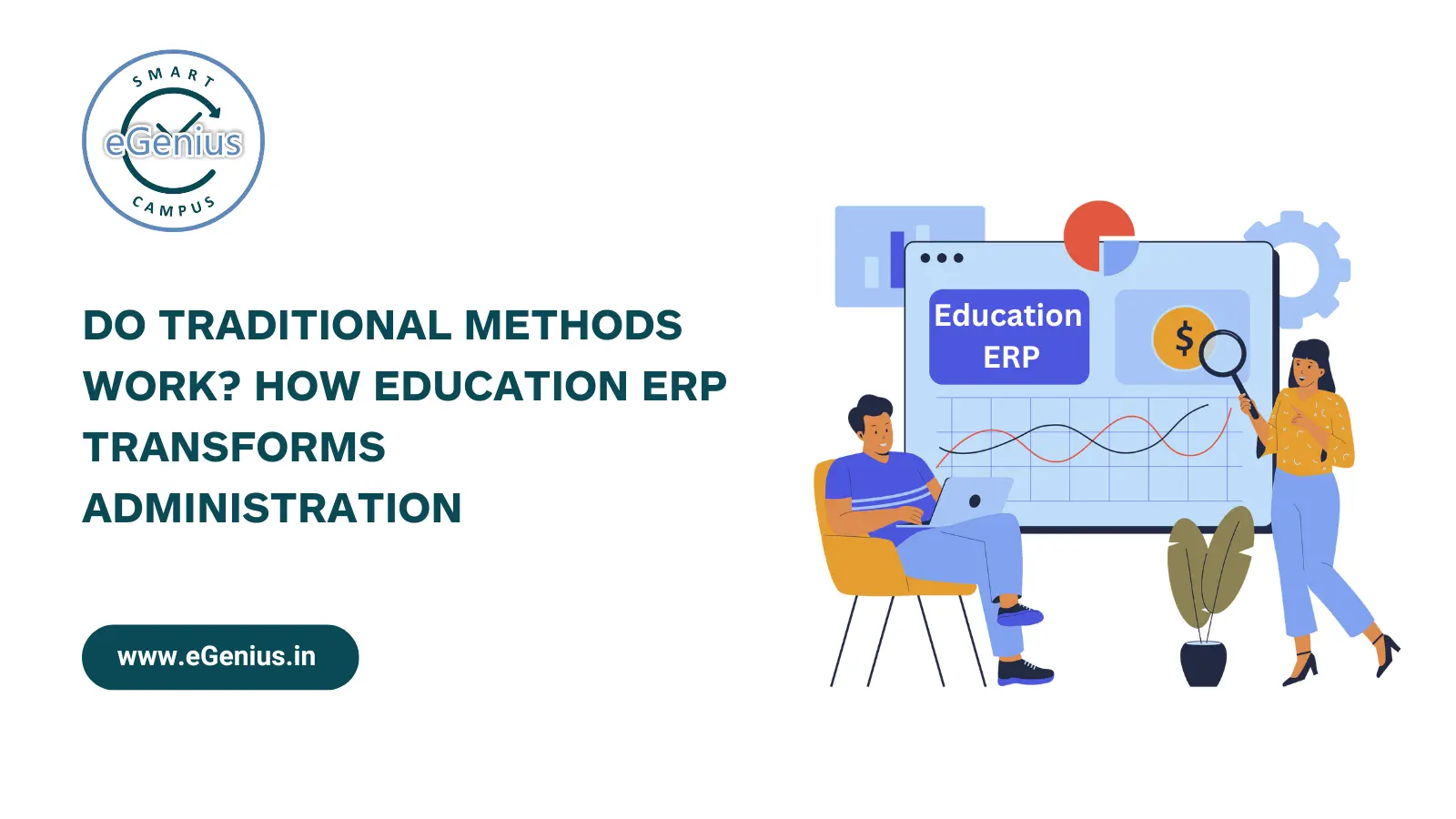In an era where technology impacts nearly every facet of our lives, educational institutions are increasingly exploring ways to streamline administrative processes and enhance operational efficiency. The traditional methods of school administration, often characterized by manual paperwork and siloed databases, need to keep up with the growing demands of modern education.
This is where Education ERP (Enterprise Resource Planning) is a game-changer, transforming how institutions manage daily operations. Through centralized, integrated software solutions, Education ERP significantly simplifies administrative tasks, boosts productivity, and enables educational institutions to deliver better student and staff outcomes.
Limitations of Traditional Administrative Methods
For decades, schools, colleges, and universities have relied on traditional methods for administrative tasks, which involve manual processes and paper-based documentation. These methods may have worked in smaller institutions with fewer students and staff, but they face severe limitations in today’s expansive education system.
- Inefficiency and Time-Consumption: Traditional administration involves paperwork, which requires time for documentation, verification, and filing. Tracking student information, fees, and staff records using this approach often leads to errors and delays, ultimately impacting productivity.
- Limited Data Accessibility: Information in traditional systems is typically stored in various files and locations, making data retrieval challenging. Accessing records for decision-making or daily tasks can become time-consuming, slowing the administrative process.
- Difficulty Coordination: Departments working independently on disparate tasks need help maintaining data consistency. Lack of coordination among finance, HR, and academic departments can lead to communication gaps, affecting operational harmony.
- High Cost and Resource Demand: Maintaining physical files, hiring staff to manage documentation, and handling other administrative costs consume a significant portion of an institution’s budget. Traditional methods require manual intervention, increasing costs without yielding proportional benefits.
Given these limitations, it is clear that traditional methods can only partially meet the evolving needs of educational institutions. Transitioning to an Education ERP system is crucial to modernizing these operations.
How Education ERP Transforms Administrative Functions
Education ERP integrates multiple administrative functions, creating a centralized platform for handling all aspects of institutional management. It enables seamless data sharing, real-time updates, and consolidated management, ultimately transforming education administration.
- Streamlined Data Management: An Education ERP consolidates data from various departments into a single system, making information easily accessible across departments. This facilitates smoother communication and ensures all stakeholders have real-time access to accurate data.
- Automated Processes: By automating repetitive tasks such as attendance tracking, fee collection, and timetable scheduling, Education ERP significantly reduces the time and effort required, freeing up resources for strategic planning.
- Enhanced Communication and Collaboration: ERP systems improve department collaboration, enabling faculty and administration to work in sync. Notifications, messaging, and alerts allow instant communication, improving overall coordination.
- Data Analytics and Reporting: Advanced reporting tools within Education ERP solutions help administrators make data-driven decisions. Real-time analytics offer insights into student performance, resource allocation, and financial health, facilitating improved planning and decision-making.
- Improved Security and Data Integrity: Education ERP systems provide secure access control, ensuring only authorized personnel can access sensitive information. Data encryption and secure logins protect student and staff information from unauthorized access.
Critical Benefits of Transitioning to Education ERP
Transitioning to Education ERP yields numerous benefits that transform educational administration. Key advantages include:
- Time Savings: With Education ERP automating routine tasks, administrative staff can focus on value-added activities, saving hours.
- Cost Efficiency: By reducing the need for manual processes and paper-based documentation, Education ERP helps institutions cut operational costs.
- Enhanced Data Accuracy: By eliminating the possibility of human error in data entry, Education ERP ensures more accurate data management, leading to reliable records and better-informed decisions.
- Better Resource Allocation: Education Management System provides insights into resource usage, enabling institutions to allocate resources more effectively. This improves budget management and optimizes the use of staff, classrooms, and learning materials.
- Student and Parent Satisfaction: Education Management System improves communication with parents by providing them access to student performance data, fee status, and attendance records. This transparency fosters trust and enhances the institution’s reputation.
How to Transition from Traditional to ERP-based Administration
Transitioning from traditional methods to an Education ERP solution can be seamless with the right approach. Institutions should consider the following steps:
- Assess Institutional Needs: Assess your institution’s specific administrative requirements. Determine the essential functionalities you need in an Education ERP solution.
- Choose the Right ERP Solution: Some ERP systems are different. Select an ERP that aligns with your institution’s size, structure, and operational requirements.
- Prepare for Data Migration: Data migration is a critical step in ERP implementation. Ensure that all essential data, including student records, financial information, and staff details, are accurately transferred to the ERP system.
- Train Staff and Faculty: Providing comprehensive training to administrators, faculty, and staff is essential for effective ERP use. Ensure that everyone understands how to navigate the system and utilize its features.
- Monitor and Optimize: Regularly monitor ERP performance and gather feedback from users. Many ERP solutions offer customization options, so adjust features and workflows to meet evolving requirements.
The shift from traditional administrative methods to an Education ERP system is transformative, delivering operational efficiency, improved data management, and enhanced communication. For institutions facing inefficiency and high costs with traditional methods, Education ERP offers a modern, comprehensive solution that addresses their unique needs. By automating time-consuming tasks, fostering real-time data access, and enabling data-driven decision-making, Education ERP revolutionizes administration, making it an indispensable tool in education. With Education ERP, institutions are improving operations and creating a conducive environment for academic success, thereby positioning themselves as leaders in the modern education landscape.















